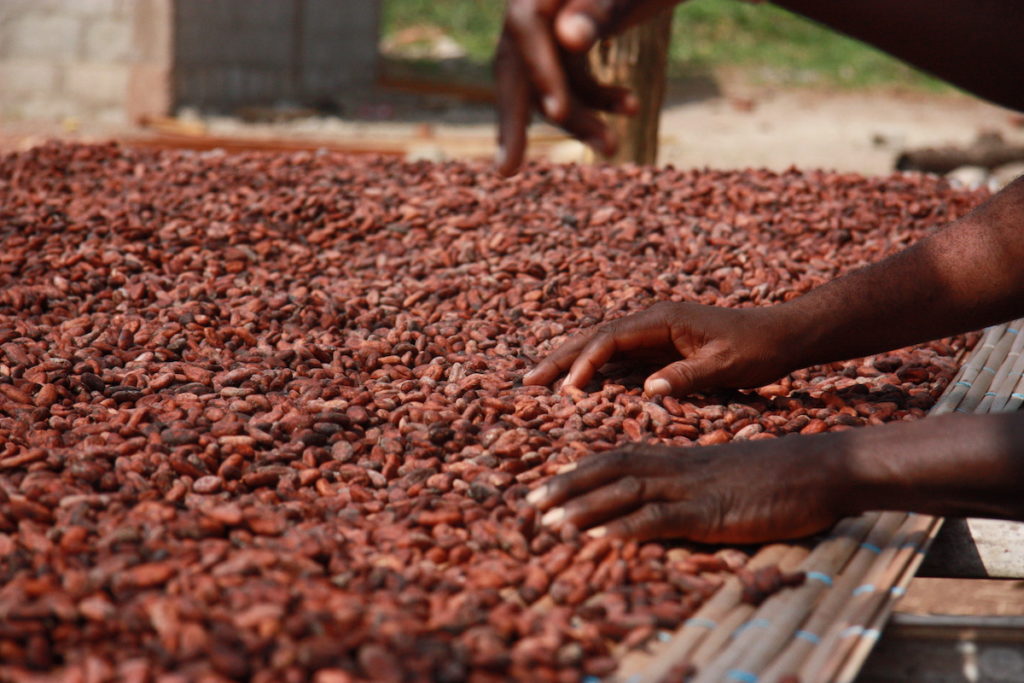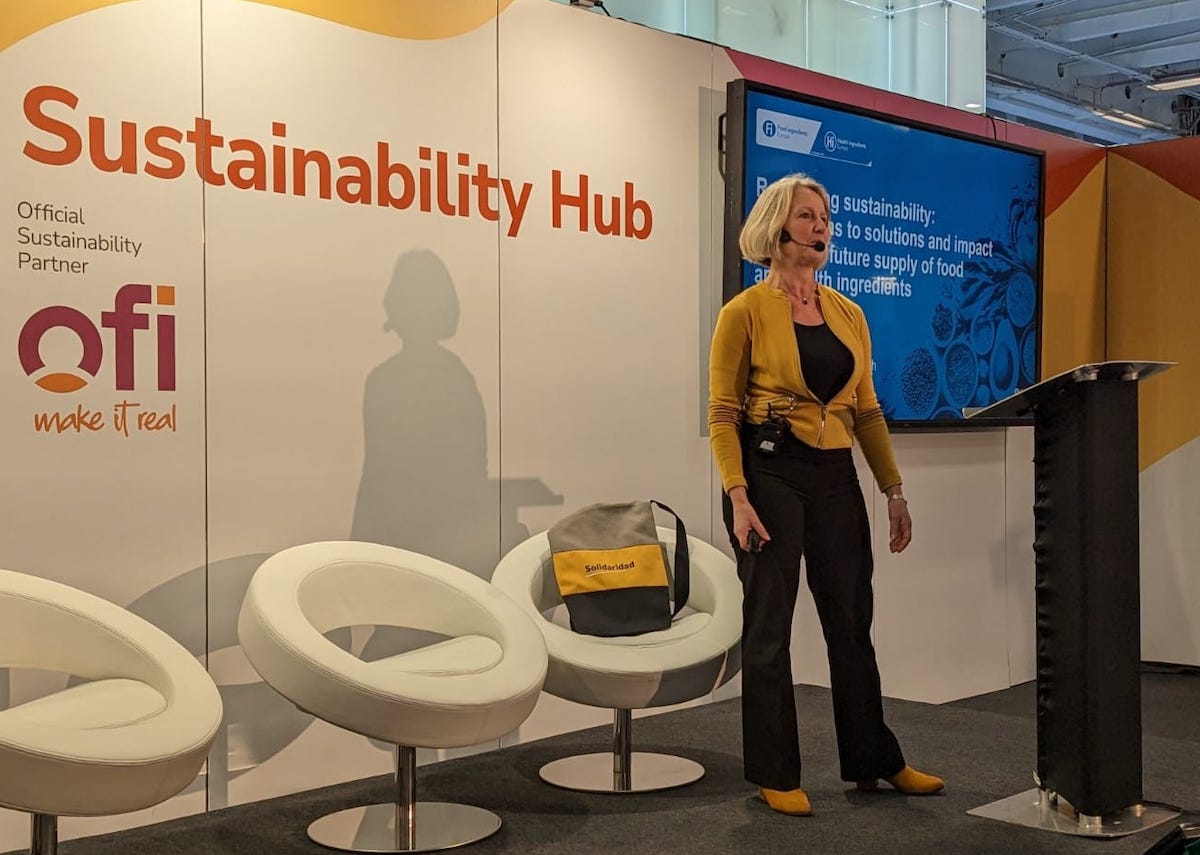On 7 December, Monique van de Vijver shared her perspective on supply chains and food system transformation at the Sustainability Hub of the FI Europe Trade Fair in Paris, a food conference with more than 20,000 attendees from 135 countries.
The following is her recap of the presentation pressing for a dramatic shift in how the world produces and markets food:
After 30+ years working in sustainability and sustainable supply chain development, the problems that smallholder farmer communities face remain the same, and they are getting worse. This is not to say that Fairtrade and other sustainability labels developed or promoted by Solidaridad have not impacted the life of smallholders farmer families in a positive way. Small-scale farmers involved in sustainability programmes and schemes have definitely benefited.
The problem is that many food industry-driven sustainability issues, such as poverty, loss of deforestation, biodiversity, water scarcity and climate change, have increased multifold over the past decades and require a far more fundamental change: a new business paradigm, with ‘do no harm’ as the bottom line.
The prevailing business model remains unfair: Exclusive and exploitative by nature
The goal of the Fairtrade label, which was launched by Solidaridad as the Max Havelaar label in the late 80s, was to set an example of a fair and inclusive trade model that would challenge businesses to change their business practices in the absence of government action. Legislators were failing to regulate a system that was exclusive and exploitative by nature. Ideally, Fairtrade would temporarily fill the gap and lead the way.
To date, many of the roughly 500 million smallholder farmers and billions of workers in the global food sector are still excluded from the formal economy or simply don’t get their fair share, while the resources they depend on are dwindling. The explanation is simple: the system has not changed. On the contrary. It only became more dominant, consolidated and out of control.
Trapped in the system
We can compare the dominant system to the Ever Given, the container ship that blocked the Suez canal in March 2021. In this case, the Suez canal represents the narrow mindedness of our current system and how the closely-held paradigms behind it block change. Buyers and suppliers are unable to see beyond the traders who control the market, which leaves little to no space for sustainable, new economy players. As soon as one slips through and becomes successful, the system seeks to absorb it and reduce it to just another container on the boat.
The consequence of this systemic problem is that the blame rests with everyone and no one at the same time. We are all trapped inside this system and seem to have no choice but to play by its rules. These rules carry on the legacy of colonial times and bear the scars of industrialization, neoliberalism and globalization.
We will not be able to turn the tide until we radically transform the system and focus on new business models. This change has to come from within, from each and every actor, and each of us as individuals.
Sustainability no longer optional
Industry players must realize that sustainability is their core business; not just the right thing to do. And it’s wise, necessary, and in due time, the only thing that will ensure a viable business going forward.
The food system relies on the consistent availability of ingredients. These ingredients in turn depend on the resources needed to produce them. For centuries we haven taken these resources for granted, to arrive where we are now: depleted soils, huge loss of forests and overall biodiversity, depleted and polluted water resources and polluted air.
Technology has brought us far, but is also part of the problem. Sustainability mandates accepting that we are part of nature. We cannot do without nature. And we need nature to help us satisfy our needs and solve our problems.
Consistently low prices trap farmers in poverty, mired in unsustainable practices
The other factor, which is underappreciated in the sustainability debate, is that of exclusion and exploitation of human resources. What we fail to fully grasp is that our daily food depends on the people who labor in the fields. Exploitation of people to maintain power and increase wealth are obsolete survival strategies for humanity. The current wars and social unrest and uprisings are a sign of the time and symptoms of a system that is fundamentally sick.

Cocoa is one of the sectors where we thought we had made the most progress. In spite of a sector wide acceptance of voluntary sustainability standards, it is still beset by socio-economic and environmental issues. The recently published 2022 Cocoa Barometer chronicles a wide range of problems facing families in cocoa communities, including child labor, gender inequality, malnutrition, lack of access to education, insufficient health care facilities and sanitation, and a variety of (labor) rights violations for smallholder farmers, workers, and tenants. Environmental issues, such as deforestation and climate change have persisted and increased, and chemical residues in cocoa beans and soils pose a growing concern and threat to the sector.
However the most important outcome of the research was that these issues will continue to grip the sector unless sustainability efforts are coupled with higher farmgate prices paid to cocoa farmers. And this brings us back to where it all started: FAIR TRADE.
Transparency, traceability and the true story
Thirty years down the line, European legislators are finally starting to fill the legislative and regulatory gaps that have allowed for the global food system to become a greedy monster (in spite of the fact that it sees itself as the pick of the litter). We are seeing how the European Green Deal is shaking up the food industry, but the monster is a clever one finding effective ways to again put the burden of sustainability on farmers and suppliers on the one end, and consumers on the other.
Supply chain responsibility, transparency and traceability are part of the new EU supply chain law taking effect this year. The EU recognizes that voluntary standards and due diligence have not achieved significant progress. This law is an attempt to regulate the system, but it still fails to address the root causes.
For businesses, sustainability can no longer be tucked away under the purview of marketing or lonely sustainability officers. CEOs and senior management must assume the mantle and encourage and facilitate each and every employee to play his or her part. Sales and profit targets must be coupled with sustainability targets, and staff should be rewarded and promoted for meeting them.
CEOs and senior management must assume the mantle and encourage and facilitate each and every employee to play his or her part. Sales and profit targets must be coupled with sustainability targets, and staff should be rewarded and promoted for meeting them.
Food industry players – not in the least retail players – can no longer wash their hands of responsibility and continue business as usual while misleading consumers with reassuring messages and green projects. They cannot expect farmers and suppliers to pay for certification and expect consumers to pay a higher price, while keeping company margins untouched. No one ever said sustainability is easy. At Solidaridad, we can tell. We have seen it. It is important that we start sharing the real story.
A new business paradigm is key. SMEs play an important role
The world’s prevailing business paradigm is built on the singular for-profit purpose that ruthlessly seeks to reduce costs of production to increase margins, profits and shareholder value. The primary mechanism for achieving this is to source at the lowest cost possible and reduce the cost of labor, while natural resources are taken for granted and considered to be free of cost. This relentless externalization of risk and costs is at the heart of our predicament.
We cannot do without resources and we cannot do without people. And so sustainability – in the interest of shared prosperity, social inclusion and balance with nature – becomes a precondition for the existence and performance of the food industry and its players. We need a new business paradigm, but the big players are like a container ship blocking our way, and they cannot easily change.
Alongside Solidaridad’s continuing work with the food industry and major players, we seed hope by supporting an increasing number of purpose driven, new economy start-ups. We focus on young, concerned, committed and highly motivated entrepreneurs, who want to rebuild the food industry and be part of the change. This is where we need to invest, in the new economy SME players on both ends of the supply chain. We need to help them to see beyond that container ship and connect them for real change and impact.
Read an interview with Monique van de Vijver on Food Ingredients Global Insights.

